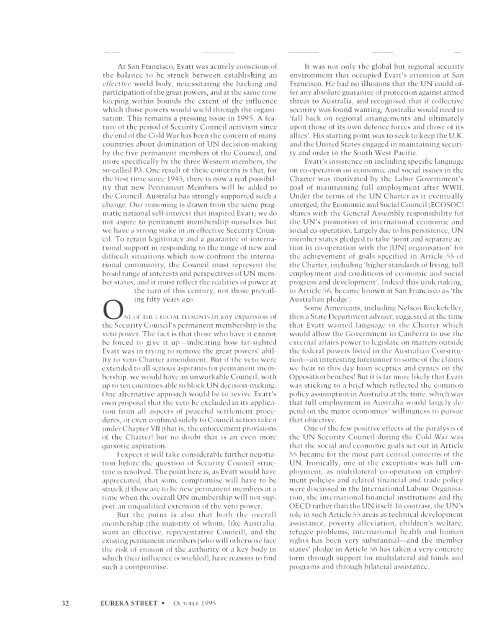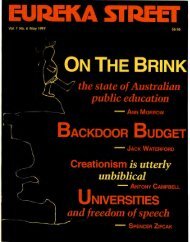At San Francisco, Evatt was acutely conscious ofthe balance to be struck between establishing aneffective world body, necessitating the backing andparticipation of the great powers, and at the same timekeeping within bounds the extent of the influencewhich those powers would wield through the organisation. This remains a pressing issue in 1995. A featureof the period of Security Council activism sincethe end of the Cold War has been the concern of manycountries about domination of UN decision-makingby the fiv e permanent members of the Council, andmore specifically by the three Western members, theso-called P3. One result of these concerns is that, forthe first time since 1945, there is now a real possibilitythat new Permanent Members will be added tothe Council. Australia has strongly supported such achange. Our reasoning is drawn from the same pragmatic national self-interest that inspired Evatt; we donot aspire to permanent m embership ourselves butwe have a strong stake in an effective Security Council.To retain legitimacy and a guarantee of internationalsupport in responding to the range of new anddifficult situations which now confront the internationalcommunity, the Council must represent thebroad range of interests and perspectives of UN m em ber states, and it must reflect the rea lities of power atthe turn of this century, not those prevailaing fifty years ago.NE OF THE C RUCIAL ELEMENTS in any expansion ofthe Security Council's permanent membership is theveto power. The fact is that those who have it cannotbe forced to give it up- indicating how far-s ightedEvatt was in trying to remove the great powers' abilityto veto Charter amendment. But if the veto wereextended to all serious aspirants for permanent m em bership, we would have an unworkable Coun cil, withup to ten countries able to block UN decision-making.One alternative approach would be to revive Evatt'sown proposal that the veto be excluded in its applicationfrom all aspects of peaceful settlement procedures,or even confined solely to Council action takenunder C hapter VII (that is, the enforcement provisionsof the C harter) but no doubt that is an even morequixotic aspiration.I expect it will take considerable further n egotiationbefore the question of Security Council structureis resolved. The point here is, as Evatt would haveappreciated, that som e compromise will have to bestruck if there arc to be new permanent m embers at atime w hen the overall UN m embership will not supportan unqualified extension of the veto power.But th e point is also that both the overallmembership (the majority of whom, like Australia,want an effective, representative Council), and theexisting permanent members (who will otherwise facethe risk of erosion of the authority of a key body inwhich their influence is wielded), have reasons to findsuch a compromise.It was not only the global but regional securityenvironment that occupied Evatt's attention at SanFrancisco. He had no illusions that the UN could offerany absolute guarantee of protection against armedthreat to Australia, and recognised that if collectivesecurity was found wanting, Australia would need to'fall back on regional arrangements and ultimatelyupon those of its own defence forces and those of itsallies'. His starting point was to seek to keep the U .K.and the United States engaged in maintaining securityand order in the South West Pacific.Evatt's insistence on including specific langu ageon co-operation on economic and social issues in theCharter was m otivated by the Labor Government'sgoal of maintaining full employment after WWII.Under the terms of the UN Charter as it eventuallyem erged, the Economic and Social Council (ECOSOC)shares with the General Assembly responsibility forthe UN's promotion of international economic andsocial co-operation. Largely due to his persistence, UNmember states pledged to take 'joint and separate actionin co-operation with the [UN] orga nisa tion' forthe achievement of goals specified in Article 55 ofthe Charter, including 'higher standards of living, fullemploym ent and conditions of economic and socialprogress and development'. Indeed this undertaking,in Article 56, became known at San Fra ncisco as 'theAustralian pledge'.Some Americans, including Nelson Rockefeller,then a State Department adviser, suggested at the timethat Evatt wanted language in the C harter whichwould allow the Government in Canberra to use theexternal affa irs power to legislate on matters outsidethe federal powers listed in the Austnllian Constitution-an interesting forerunner to some of the claimswe hear to this day from sceptics and cynics on theOpposition benches ' But it is far more likely that Evattwas sticking to a brief which reflected the co mmonpolicy assumption in Australia at the time, which wasthat full employment in Australia would largely dependon the major economics' w illingness to pursuethat obj ective.One of the few positive effects of the paralysis ofthe UN Security Council during the Cold War wasthat the social an d economic goals set out in Article55 beca me for the most part central concerns of theUN. Ironically, one of the exceptions was full employment,as multilateral co-operation on employment policies and related financial and trade policywere discussed in the International Labo ur Organisation,the international financial institutions and theOECD rather than the UN itself. In contrast, the UN'srole in such Article 55 areas as technical developmentassistance, poverty alleviation, children's welfare,refugee problem s, international health and humanrights has been very substantial- and the memberstates' pledge in Article 56 has taken a very concreteform through support for multilateral aiel funds andprograms and through bilateral assistance.32EUREKA STREET • O CTOBER 1995
The 'pledge' in Article 56 has come to be one of thefeatures of the UN that distinguishes it from theLeague of N ations. It has been the basis for initiatinga range of programs and a variety of roles that havehelped the UN endure its setbacks and retain the faithof m ember states when the League failed to do so. Amajor debate is currently taking place-in which Australiais a central participant- about the UN's role ineconomic and social development, and about makingECOSOC a more effective body for developing andimplementing programs for international co-operationin a more co-ordinated and effective way.A further element of continuity in our foreignpolicy from Evatt's period as Foreign Minister is ourcommitment to the promotion of human rights. AsPresident of the UN General Assembly in 1948, Evattpresided over the adoption of the Universal Declarationof Human Rights.This was much more than a symbolic act for him:throughout his career there was evidence of his basicattachment to civil and political and economic, socialand cultural rights. In the 1920s in the NSW Parliament,he introduced abolitionist legislation andargued for minimum labour conditions. At San Francisco,he backed Jessie <strong>Street</strong>'s efforts to obtain gen der equality within the UN as part of the Charter. Asa lawyer h e defended freedom of speech in numerouscases, with the struggle over the Communist Partydissolution act no more than the icing on the cake inthis respect.The Universal Decl aration remains the foundationfo r the standa rds of human rights andfundam ental freedoms accepted by the UN MemberStates-the basis for the six major human rights instrumentsand all the machinery and expert bodiesassociated with them . T wo Australian s, ProfessorPhilip Alston and Ju stice Elizabeth Evatt- Dr Evatt'sniece- serve with distinction on two of these bodies,the Committee on Economic, Social and CulturalRights and the Human Rights Committeerespective! y.D R EvAn WAS NOT CONTENT, however, with establishingand articulating standards in the UN; healso sought effective ways of implem enting them . In1947 Australia proposed that an International HumanRights Court be established. T his was an idea wellahead of its time, and even in 1988 when we revivedthe idea on the occasion of the 40th anniversary ofthe adoption of the Universal D eclaration, the notionof a single supervisory body was too bold for many.Several developments since, including the establishment of tribunal to consider extrem e and outrageoushuman rights violations in the former Yugoslavia andRwanda, and the growing realisation that six paralleltrea ty bodies is a cumbersome arrangement, suggestthat the option of a single body to m onitor observanceof basic standards may be an idea whose timehas com e.As we all know, Evatt's career after his days asforeign minister, which ended with electoral defeatin 1949, was not a very happy one for him or his Party.Opposition was not his forte. Parliament was nothis preferred forum. Dom estic politics did not comeeasily to him, although no one should ever forget hisinspired leaders hip of the constitutional referendumcampaign in 1951. Party politicking was almost en tirely beyond him, and it may be that his ineptitudehere made the great Labor split of the 1950s worsethan it need have been.Probably we will never know to what extent declininghealth contributed to his difficulties in thoseyears. By the time he retired from politics and becameChief Justice of N ew South Wales in 1960his condition certainly was sad indeed.E vAn's MEMORY HAS lEEN TARN ISHED in this countrybecause of events in the 1950s and the embarrassm entsof his final years in public life. But for all the controversyand criticism he generated, Evatt was one of thedefining figures in our nation's history. It is an ambiguouslegacy, true, for those of us in the Labor movement.His setbacks as Labor leader in the 1950s andhis contribution to the ALP split contributed mightilyto keeping the Party out of power for twenty- threeyears. But on the m ore positive side, Evatt has left uswith an invaluable legacy in our law, our institutionsand elem ents of our policy, because of his vision fo rAustralia as a social democracy, because of his fightagainst a proposal for constitutional change whichwould have worked tragically against this country'sfundam ental freedoms, and because of his far-s igh tedpursuit of our interests in collective secu rity and international co-operation.It is above all the Eva tt of Sa n Francisco who deservesto be rem embered, and remembered with bipartisanpride. As Paul Hasluck, who worked with himat San Francisco (and had very mixed feelings indeedabout his personal qualities), wrote: 'at the conclusionof the San Francisco Conference ... Evatt ... wasrecognised as a fi gure of m om en t on the world scene'.At the conclusion of the Conference, the AmericanSecretary of State, Edward Stettinius, declared that 'noone had contributed more to the Conference than MrEvatt'. The Peruvian delegation went so fa r as to movea resolution that the small powers 'pay homage to theirgrea t champion, Mr Evatt'. And the New York Timessaid of him, in perhaps the finest tribute of all, thatthere were two kinds of power, that exercised throughcrude national muscle and coercive m ethods, and thatpurveyed by the force of ideas, argument and intellectualeffort, and that Herbert Vere Evatt epitomised thelatter.•Gareth Evans is Minister for Foreign Affairs and Leaderof the Government in the Senate. The 1995 MannixMemorial Lecture was delivered by Senator Evans atMelbourne University in August, 1995.V OLUME 5 N UMBER 8 • EUREKA STREET 33
- Page 2 and 3: ~ LORETO ~ ,~ , ~~,:: : 11,;: , Hal
- Page 4 and 5: C OMMENT: 1A magazine of public aff
- Page 6 and 7: ca tive structures of oppression',
- Page 8 and 9: LettersHate mailFrom Noel TurnbullP
- Page 10 and 11: haves and have nots which make secu
- Page 12 and 13: Vi EWPOINTNeither a borrower,nor a
- Page 14 and 15: AN OPPORTUNITY TO LIVE & WORK INANO
- Page 16 and 17: Home truthsL '" "'" MOOCconfirmed c
- Page 18 and 19: T HE CAROLINE CHISHOLM S ERIES : 9G
- Page 20 and 21: I suspect too that the bishops eta]
- Page 22 and 23: their experience. The Church would
- Page 24 and 25: REPORTJiM D AVIDSONScholars on the
- Page 26 and 27: Gareth Evans, above,on another occa
- Page 28 and 29: Speaking in 1965 of Dr Evatt's term
- Page 30 and 31: gardcd as a procedural question) an
- Page 34 and 35: PoETRYIllacera to spiri toThe Tenor
- Page 36 and 37: Mrs Laszlo's torteAs A CH'W I WAS A
- Page 38 and 39: I understood Mrs Laszlo from The Sc
- Page 40 and 41: THE CHURCHT , o"co"" mSOME LETTERS
- Page 42 and 43: STORYTREVOR HAYSome desolate shadeI
- Page 44 and 45: and laugh with his strutting aboutl
- Page 46 and 47: P OETRYJACK HlBilERDEigh t poems fo
- Page 48 and 49: BOOKS: 1P ETER STEELESouthern light
- Page 50 and 51: and without too much irritatingecon
- Page 52 and 53: BooKs: 3JIM D AV IDSONA timely life
- Page 54 and 55: BooKs: 4R AY C ASS INGoody GoodiesL
- Page 56 and 57: confronts Kafka with images fromhi
- Page 58 and 59: teen life: substance abuse (specifi
- Page 60 and 61: One's old manD'Artagnan 's Daughter
- Page 62 and 63: Show 'n' hell timeI ST AS OTHER RWG
- Page 64: &Aurora BoolzsSpecial Book OfferAus
















